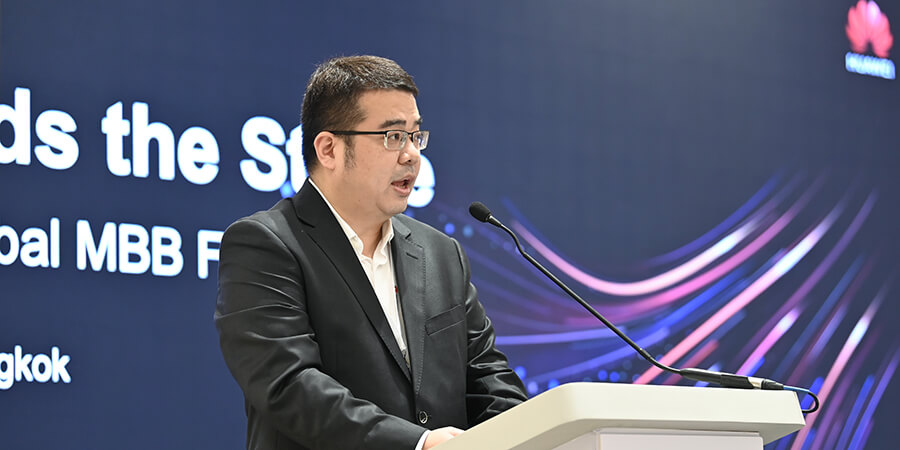The relentless development of 5G technology has also made technology providers rethink their carbon emission strategies.
Green strategies were also high on the agenda at the Huawei Mobile Broadband Forum 2022 in Bangkok.
Addressing the media during a roundtable event, Emanuel Kolta, senior analyst, networks ustainability and innovation, GSMA Intelligence, said that more companies are no realizing the higher expenses on energy consumption. “Needless to say, energy is the third most important operational cost for mobile operators after site rentals and human labor. This is why I think all of the operators in the last two days mentioned energy efficiency.”
He added, “The output of industries is constantly changing; it used to be obviously voice, but with SMS, data and with 5G, the picture is getting more complex. So I think when someone is talking about energy efficiency and how [to be] more energy-efficient, I think there are a huge variety of drivers, and data traffic is a very important one; also network coverage, the number of devices, and the experience – the metric you use, that metric is also changing.”
Duan Hao, vice president of Huawei's SingleRAN product line, also said that Huawei regards energy efficiency as one of the top priorities when working with industry partners in the emerging market. “In the emerging markets, we have seen the same demands for green and energy savings. Faced with global warming, the whole ICT industry, including the telecom operators, need to show their due responsibilities. Many telecom operators in emerging markets have already taken energy-saving as one of the highest priorities. And Huawei, as one of the vendors, aims to help telecom operators to build a green wireless industry. And help them save energy at the sites while reducing the OPEX and ultimately achieving business success.”
And since some operators believe that efficient equipment is the key to energy saving, Huawei has set three key measures to improve energy efficiency in the whole network in our energy-saving strategy.
The first is to continue to improve the efficiency of the hardware equipment; they are aiming to provide equipment with a “0 bit 0 watt” target. Huawei also has innovative products and solutions when it comes to the sites. Huawei believes that there is great potential that can be brought about by site linkage to save energy. Moreover, intelligent scheduling of the sites and the application of intelligent technologies at the sites can help the telecom operators save energy in all scenarios.
Jiang Xudong, president of Huawei SingleRAN Product Line, also called on operators to rethink their energy-efficiency plans as they may be facing higher electricity consumption in the next few years.
He noted, “If telecom operators do not invest in energy-saving solutions, they will see an increase in their OPEX. According to statistics, taking the Chinese telecom operators as an example, by the year 2026, their network energy consumption will go up by 50–60% if they do nothing to reduce energy consumption. At the same time, we have witnessed that countries in Europe and China have already prepared carbon neutrality and carbon peak targets, so if we do not take measures to save energy at the equipment level, site level, and network level, it will be very difficult for us to achieve the decarbonization targets.”
He added that with Huawei’s "3+1" Green Target Network Concept and Innovative Solutions, they’re confident that they have the capability to continue to help telecom operators improve their energy efficiency and achieve the carbon peak and neutrality targets while reducing OPEX. “In the energy domain, we are talking about three targets that cannot be achieved at the same time. One is green, another is safety and another one is economy. So we have to improve energy efficiency by leveraging technological innovations. That is the only way forward.”
Huawei’s Greensite Solution, which allows the industry to achieve intelligent linkage between services and site auxiliary equipment, has also helped some of their industry partners reduce their energy consumption.
Jiang said that as of now, Huawei’s intelligent energy-saving solutions have already been deployed by over 100 telecom operators. In China, according to their statistics, it has saved 400 million kw/h of electricity every year.
Additionally, due to the energy crises that are being experienced across many parts of the globe, more operatorsare adopting Huawei’s green energy solutions. One of them is Orange, which has initiated green and energy-saving projects in Spain. Huawei has been able to reduce energy consumption by 10% YoY through such projects.
Lastly, Huawei’s latest product, MetaAAU, is now being widely deployed in China, the Philippines, etc. Under the same coverage, this product is able to lower energy consumption by 30%.





